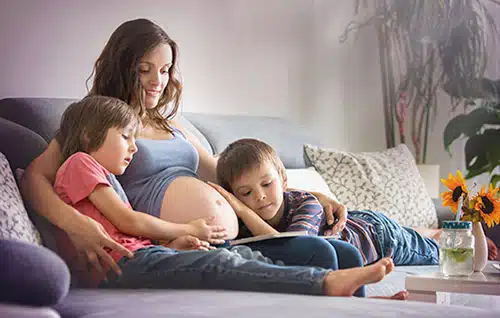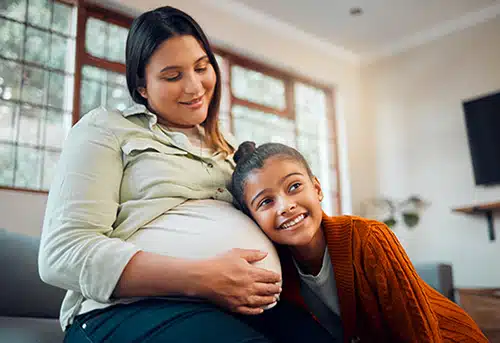
You’re not alone if you are struggling to explain your adoption plan to your other children. Many pregnant women who are thinking about adoption have other children they are raising. This guide will help you talk to your kids in a way they can understand. It’s designed to help you have age-appropriate conversations with your children about adoption. Every child is different, so adjust these suggestions based on what works best for your family.
Table of Contents
- Help Make Adoption Feel Normal
- Prepare What You’ll Say
- What to Say Based on Their Age
- What NOT to Say
- If You’re Planning an Open Adoption
- Helping Your Children Be Part of the Process
- Handling Your Own Emotions
- Helping Your Children Feel Safe
- Common Questions Kids Ask
- Helpful Children’s Books
Help Make Adoption Feel Normal
Start by teaching your children about adoption before you need to explain your decision. You can do this by:
- Reading bedtime stories about adoption
- Watching movies that show adoption in a positive way (like “The Land Before Time” or “Kung Fu Panda 2“)
- Talking about adoption as a normal part of life
- Having your children draw pictures or write letters to their new baby brother or sister
Drawing and writing help children share their feelings when they don’t know the right words to say.
Prepare What You’ll Say
Before speaking with your children, take a few moments to jot down some notes for the conversation. These notes will help you stay calm and remember the important points. Here’s a good example of what to say:
“You know Mommy is going to have a baby, but there’s another family out there who can’t have a baby on their own. It’s been a really hard decision, but I’ve decided that this baby is going to live with that family, where they will be loved and cared for just as much as if they lived with us.”
Don’t wait until the last minute to have this conversation. Start talking about adoption once you’ve decided that it’s the right choice for this pregnancy. Having the conversation early gives your children time to understand and ask questions.
What to Say Based on Their Age
For Young Kids (Ages 3-6)
Keep it simple and focus on love and safety. What to say:
- “I love you and I love the new baby very much.”
- “The baby is going to live with another family who really wants a baby.”
- “You are safe with me. I will always take care of you.”
- “Sometimes moms have to make hard choices to help their babies.”
Sample conversation: “Remember how we read that book about the bird who found a loving family? Well, our new baby is going to live with another family who can’t have a baby on their own. They will love the baby just like I love you.”
For Older Kids (Ages 7-12)
You can give more details and answer more questions. What to say:
- “I made this choice because I want what’s best for the baby.”
- “Taking care of three children would be very hard for our family right now.”
- “The baby will always be your brother or sister, even if they live somewhere else.”
- “This doesn’t change how much I love you or how I take care of you.”
Sample conversation: “I know this might feel confusing. I’m choosing adoption because I want the baby to have everything they need. Another family who has been waiting for a baby will take care of them. You will always be the baby’s big brother/sister.”
What NOT to Say
Avoid these phrases that might scare your children:
- “We can’t afford another baby” (kids might worry about money)
- “The baby would be too much work” (kids might think they’re work too)
- “We’re giving the baby away” (sounds like throwing away)
- “The baby doesn’t belong with us” (might make kids feel unwanted)
If You’re Planning an Open Adoption
Explain what this means for your family:
- “Adoption doesn’t mean goodbye forever.”
- “We might get pictures of the baby growing up.”
- “We might visit the baby once or twice a year.”
- “The baby will know about our family and that you are their big brother/sister.”
Helping Your Children Be Part of the Process
If you’re planning an open adoption, you might want your children to meet the baby’s adoptive family. This helps in several ways:
- They’ll know who their sibling will live with
- It makes the adoptive parents feel real, not like strangers
- It helps children understand that adoption is about love, not giving away
Ways Your Children Can Show Love
Let your children create special things for the baby:
- Draw pictures for the baby to keep
- Write letters to their little brother or sister
- Pick out a special gift for the baby at the hospital
- Make a scrapbook or photo album for the adoptive family
This helps your children feel important and part of their sibling’s future life.
Handling Your Own Emotions
When you’re going through the emotions of adoption yourself, it can be hard to always stay strong for your children. But it’s important to:
- Show confidence in your adoption decision
- Tell your children it’s okay to feel sad
- Remind them of the wonderful things waiting for their baby brother or sister
- Let them know they will always be a big brother or sister
Remember that your children will have mixed emotions too – just like you do.
Helping Your Children Feel Safe
Kids might worry that you’ll give them away, too. Help them feel secure by:
- Telling them over and over that you love them
- Explaining that they are staying with you forever
- Showing them that their daily routine won’t change
- Letting them know it’s okay to feel sad or confused
- Answering their questions honestly
Common Questions Kids Ask
“Why can’t the baby stay with us?” “I want to make sure the baby has everything they need. Another family can give the baby things we can’t right now.”
“Don’t you love the baby?” “I love the baby so much that I want them to have the best life possible. That’s why I’m choosing a family who can give them everything they need.”
“Will you give me away, too?” “Never. You are staying with me forever. I will always take care of you.”
“Can I still see the baby?” “The baby will always be your brother/sister. We might get to see them sometimes, and we’ll get pictures to see how they’re growing.”
Simple Checklist for Parents
□ Start talking about adoption early on
□ Use books and stories to make adoption feel normal
□ Keep explanations simple and age-appropriate
□ Focus on love and what’s best for the baby
□ Help your children feel safe and secure
□ Let them draw pictures or write letters to the baby
□ Be ready to answer questions over and over
□ Get help from a counselor if you need it
Your Adoption Coordinator can refer you to a licensed therapist who can help at no cost to you. In addition, we can connect you with a birth mother using Lifetime’s peer support network. With peer support, you have the opportunity to receive advice from another woman who has been in a similar situation and chosen adoption. Many women find it helpful to talk with someone who has placed a baby for adoption and can answer their questions firsthand about what it was like for her.
Helpful Children’s Books
For Younger Children (Ages 3-6):
“Forever Family“ by Kelly and Lindsey Bullard explains adoption using “Gotcha Day” and is great for families wanting to explain adoption to their biological children.
“A Mother for Choco“ by Keiko Kasza is about a bird who finds a loving adoptive family.
“All Together Now” by Anita Jeram shares the story of Mommy Rabbit’s family. She has three children: Bunny, Little Duckling, and Miss Mouse. The author uses this family of different animals to tell a story of love and family.
For Older Children (Ages 6-10):
“The Mulberry Bird“ by Anne Braff Brodzinsky tells the story of a mother bird who makes the difficult choice to place her baby with another family who can care for him.
“ABC, Adoption & Me” celebrates family while discussing complex adoption issues, with vibrant artwork and multicultural families.
“Sam’s Sister” is told from the point of view of five-year-old Rosa, who feels mixed emotions when her pregnant mother arranges an open adoption for her baby brother Sam. The book teaches children that love is more important than living arrangements, as Rosa embraces her permanent role as Sam’s sister.
Explaining Adoption to Your Other Children
Adoption is a loving choice. You can help your children understand that by being honest, patient, and focusing on love. It’s okay if they feel sad or confused – these are normal feelings. Keep talking to them and answering their questions.
Important reminders:
- Don’t over-explain to young children – this may confuse them more
- Create a positive environment where adoption is always welcome to discuss
- Remember that adoption is a lifelong journey for your whole family
- Be open and honest before, during, and after the adoption
If you need help with what to say, talk with an Adoption Coordinator at Lifetime for help with developing a plan. Just call or text Lifetime at 1-800-923-6784.
Editor’s Note: This article was originally published on May 22, 2018, and has since been updated.
As Vice President of Lifetime Adoption, Heather Featherston holds an MBA and is passionate about working with those facing adoption, pregnancy, and parenting issues. Heather has conducted training for birth parent advocates, spoken to professional groups, and has appeared on television and radio to discuss the multiple aspects of adoption. She has provided one-on-one support to women and hopeful adoptive parents working through adoption decisions.
Since 2002, she has been helping pregnant women and others in crisis to learn more about adoption. Heather also trains and speaks nationwide to pregnancy clinics to effectively meet the needs of women who want to explore adoption for their child. Today, she continues to address the concerns women have about adoption and supports the needs of women who choose adoption for their child.
As a published author of the book Called to Adoption, Featherston loves to see God’s hand at work every day as she helps children and families come together through adoption.






0 Comments